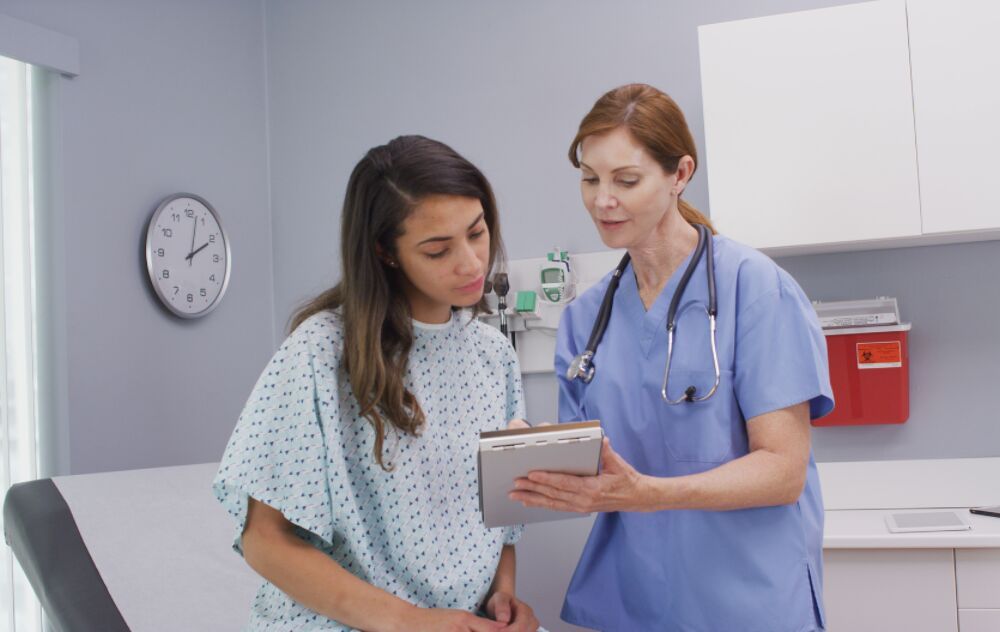
A leiomyoma is the scientific name for a benign tumor, which grows in the “smooth muscle” of the uterus or gastrointestinal tract. Most commonly known as a fibroid, this tumor is not always easily detectable because it can vary in size, number, and location. If you’re concerned that you may have fibroids, you can receive an accurate diagnosis from the expert fibroid specialists at USA Fibroid Centers.
Leiomyoma Symptoms
Many women think abnormal periods or severe pelvic pain are normal menstrual symptoms. However, these are common fibroid symptoms, and can be alleviated through Uterine Fibroid Embolization (UFE). Other fibroid symptoms include:
- Menorrhagia (heavy periods lasting 10 days or more)
- Frequent urination or difficulty fully emptying the bladder
- Pain during intercourse
- Fatigue caused by iron-deficiency anemia
- Severe pelvic pain or cramps
- Constipation or other bowel issues
- Bleeding between menstrual cycles
Part of our mission is to provide information about fibroid symptoms and treatment options so patients can make the best decisions for their health and wellbeing.
Why Are Leiomyomas Called Tumors?
Uterine fibroids are also commonly referred to as tumors, which can be confusing to many women during diagnosis. The word tumor can bring worry and fear; however, less than 1 in 1,000 cases are deemed cancerous. When fibroids are cancerous, they are usually referred to as a leiomyosarcoma.
The definition of a tumor is an abnormal growth of cells that are unlike other cells in your body. A benign tumor, which most fibroids typically are, is a noncancerous grouping of abnormal cells. This means that it does not invade nearby tissue or spread to other parts of the body the way cancer does. Benign tumors are typically watched by the doctor to make certain that they do not develop into being cancerous.
Leiomyomas vs. Leiomyosarcomas: What is the Difference?
Both leiomyomas and leiomyosarcomas are tumors that may appear in the uterus. The difference between the two is that leiomyomas are non-cancerous tumors, while leiomyosarcomas are cancerous tumors.
Leiomyosarcoma is a rare type of cancer that affects only one to five women out of 1,000 who have fibroids. Both types of tumors can grow, but only the leiomyosarcoma can spread to other parts of the body.
Leiomyoma Types
Several types of uterine leiomyoma exist, depending on where they are located in the uterus.
- Intramural: Tumor located within the uterine wall
- Subserosal: Tumor located under the perimetrium
- Submucosal: Tumor located in the endometrial cavity
Regardless of location, treatment may become necessary if the leiomyoma presents with symptoms or affects fertility.
Uterine Fibroid Embolization to Treat Leiomyoma
If you are suffering from pain or other symptoms of a leiomyoma, you can benefit from treatment. Uterine Fibroid Embolization (UFE) is a non-surgical procedure that shrinks the fibroids and can alleviate symptoms. For example, UFE results in lighter, shorter periods and can eliminate severe pelvic pain. USA Fibroid Centers offers UFE as an outpatient procedure, so you don’t have to worry about taking a lot of time off for a long recovery; in fact, most patients are back to their regular activities within a week.
UFE treats leiomyomas by cutting off the blood supply to the uterine artery feeding the fibroids. During the procedure, an interventional radiologist will use ultrasound to locate the fibroids and insert a catheter to send embolic agents to block the artery. This procedure takes about 30-45 minutes, depending on the number of fibroids that need to be treated. To learn more about UFE, request a consultation with a fibroid specialist today.
Get Treatment for Fibroids, Call USA Fibroid Centers Today
Let USA Fibroid Centers help you find freedom from your leiomyoma symptoms. Our fibroid specialists can develop a personalized treatment plan and answer any questions you may have. Contact us for a telemedicine appointment or an in-person visit at one of our treatment centers. Schedule online or give us a call at 855.615.2555 to meet with our interventional radiologists.



